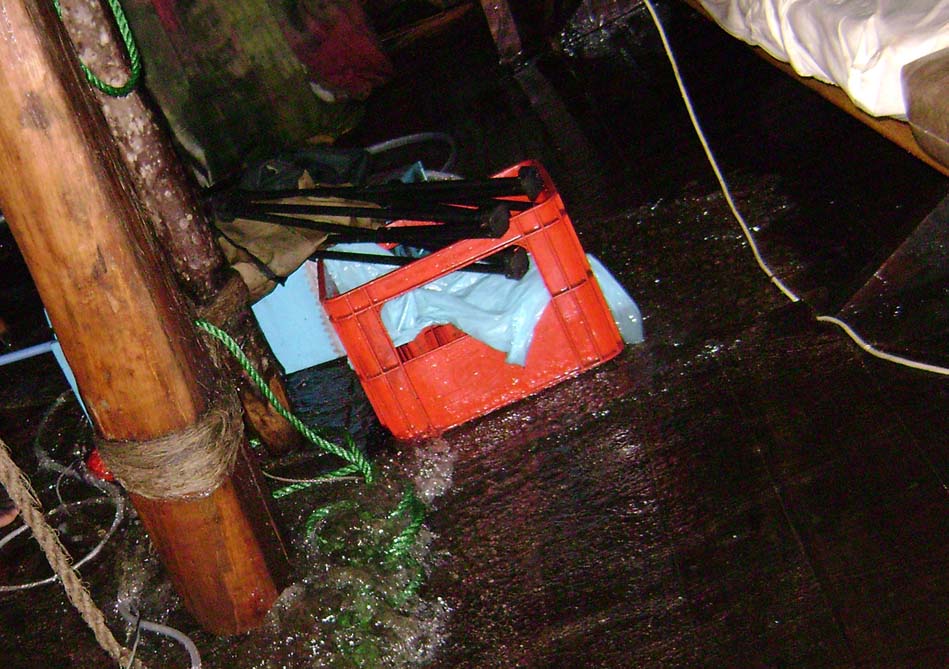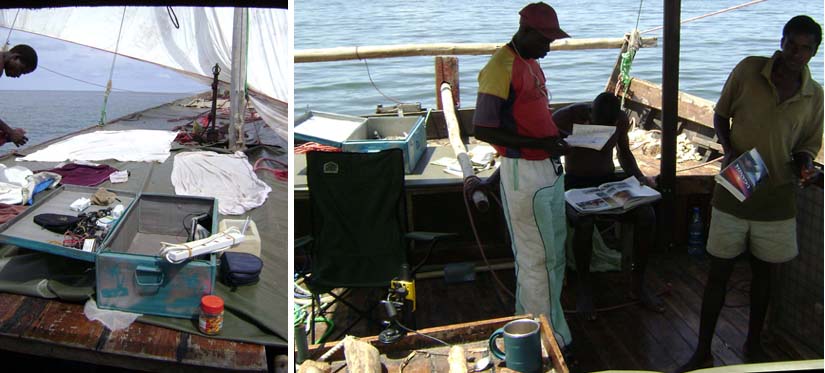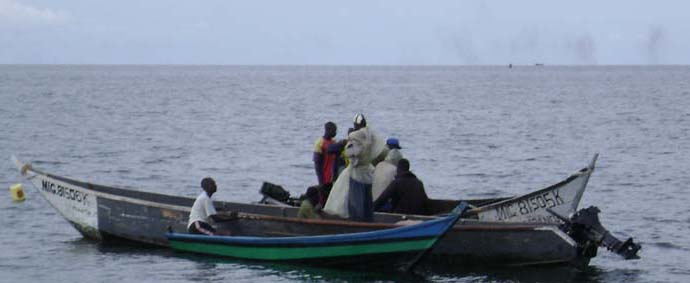
Crtd 07-11-03 Lastedit 15-09-14
Storm
"No not a train, a tornado"
071103 07:00 (saa moja) Dep Musoma E 3, 11:00 Very early wind turn to NW 3-4, 17:00 Wind down, we moor mid lake 6 km SW of three-country border point Uganda, Kenya, Tanzania (still in TZ), we did 68km. Rainstorm far E brings some ENE 7 but no rain. Heavy waves at night toss water and badly stowed items around in ship.
071104 07:00 (saa moja) Very cloudy. At first no wind and two rainstorms far, one N one SW, then head wind and waves from the N storm. One pump had its filter washed off by the tossing water, caught dirt and got fucked. We are left with two pumps. Crew sea sick. Captain eats too many pills (malaria, worms, bladder infection) to feel anything.

Photo: rainstorm gives N wind and waves on our mid lake mooring
15:30 Rain/thunderstorms all round, but we sneak NE on NW 4-5
and try to reach small Mbaiyu Island in Karungu Bay (yes the Karungu fishing village
I visited on my 2005 dirt bike
trip from Mwanza back to Jinja). But before we reach, a heavy thunderstorm
confronts us head on, forcing us to quickly drop and bind the sail, anchor mid
lake and go inside waiting for the worst. Darkness set in and the worst came. Worse than ever.
Torrential rain and gale W 10. On the big waves the dhow bends from one ear to
the other, so the pond of rain on the deck tent had all chance to spread
everywhere over the deck under the tent. The deck is not watertight, that is why
we have the tent. Water was pouring down from the ceiling in streams at
many places. The captain's bed, usually free of downpours in such ordeals, now
got some drips on the foot side, thought forgivable by captain lying there,
trying to have a bit of sleep. However the downpour gradually gained territory
towards his head side. A curious heavy low trembling sound gets louder and
louder. He jokes:
"Philemon, can you take a look which train is passing?"
Philemon had a look out of the front hatch, which, he later told, had to hold
firm to prevent it from flying away.
"No, no train, a tornado".
We have to rely on Philemon's observation that it passed at 300 m, because,
whether or not for an honourable reason, I decided not to have a look. Philemon
says it looks like a white chimney in the night because of the water it sucks
out of the lake which is then cast around in the air.
Meanwhile the rain and the tornado's lake spray added to the leaking water we had been unable to pump.
In big waves, bottom water is tossing from left to right over the bottom while
the ship bends from one ear to the other. When you try to pump, bottom water
just passes the pumps every two seconds in great speed, in a pendulum movement,
usually washing off the plastic cotts I mounted as filters to prevent dirt
getting in. Apart from this split second of fast passing, the pumps pump air
only. No use pumping.
After one hour water had risen above the floor and bottom boards started to
float (see photo under)

Photo: dhow jumping around on thunderstorm waves from one ear to the other, floor floating, water tossing around, right a tip of the captain's soaked bed sheet (last photo of the day, camera got wet and batteries had to be removed)
Crew had fled to relatively dry places. Captain stayed on his bed, now had found another watertight mattress to use as a roof and decided to replace his soaked sheet by two blankets, put a thick towel over his head and decided to cease paying attention to anything until he would feel he started to float. He got again between pretty damp and soaked, but did not move and was later reported to have slept the rest of the night to the astonishment of crew.
071105 07:00 The next morning was cloudy, but wind and waves were gone, and
we had to start realizing the full meaning of "everything is wet". Water in
front of mast 3 cm above bottom boards. "Dry" metal boxes, as far as they had
been standing on the floor, were filled with water though their bottom joints.
Spectacles of captain were washed from box and its glasses got, the rest of the
night, a solid grinding under the floating bottom boards. Coffee grinder worked
but with cover under 230 V electric power.
Volt meter caught water and fatal shortcut. Captain had bumped his left big toe during storm. Nail looks lost. We pumped and
got all water out.

Photo: drying; crew lost in reading of wet books

Photo: crew after helping Karungu fishermen to get their drifted nets free of our anchor (horizon: lake fly towers). These fishermen had passed the stormy night near us, feeling very secure because they know that Tanzanian dhow sailors have magic to ward off tornadoes
Sun clears sky while we are delayed by fishnets the storm blew in our anchor. 11:00 We leave NNE on SW 2 freshening to WSW 4. Before establishing connection between computer and GPS we have to scrape the rust off the USB plugs and dry them in the sun.

Photo: Karungu bay, locus of our water ballet, volcano and loads of iron roofs reflecting sun